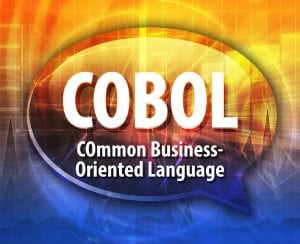Did you know that COBOL was one of the first computer programming languages? It’s been around for a long time, so most companies may have started with this type of platform. COBOL is an acronym for Common Business-Oriented Language.
It was developed in 1959 and was one of the first programming languages to be used by organizations. It’s still being used today because many companies have made investments in their legacy systems. These systems rely on COBOL, or they don’t want to spend money upgrading their software to a new platform.
We’re going to talk about this system and how it could be helping your business, or if it may be time for you to migrate to another platform.
Thinking about software migration? Keep reading as we talk about what you should do to prepare, or what you can do differently if you stick with COBOL.
What Is COBOL?
COBOL is a compiled language that uses English-like syntax. It’s been designed for business and finance applications. This means that it has features like file handling, data manipulation, etc. that are needed for those types of applications.
COBOL code can be run on many different platforms, including Windows, UNIX, and Linux systems.
You may be wondering what makes this type of programming language unique. Essentially, it was made by individuals that wanted a type of language that could be used to describe issues in a way that is completely different from the hardware associated with it. The program itself is made up of syntactical oddities that make it easy to use for different end-users.
The thing that you will realize is that the program consists of divisions, sections, statements, etc. This is because it doesn’t have any functions or subroutines associated with it. Yes, this software is still very popular. When it was first released, it was among the most advanced types of languages in its prime.
It was the perfect solution for business-oriented tasks. Banks, as well as insurance companies, drove its popularity due to its heavy usage for computerized operations.
Are There Alternatives to COBOL?
There are multiple alternatives to COBOL. What you use would be dependent on what your team knows, what you have access to, and essentially what you need the software for.
This is one reason that speaking with COBOL consultants may come in handy. Doing so will allow for an expert user to do the heavy lifting for you. Let’s take a look at a few popular alternatives:
- Python
- Java
- C-Lang
- Cobalt
- JavaScript
Python is essentially a scripting language that is growing in popularity. It has an intuitive syntax, making it easy for beginners to learn, while also providing features and capabilities for more experienced developers. Python can work with Windows, MacOS, and Linux platforms.
Java is a versatile language that runs on the Java Virtual Machine (JVM). This makes Java portable and able to run on pretty much any device or platform.
Java is what’s used in many large-scale systems. Some include finance, healthcare, manufacturing, logistics, and telecommunications.
C-Lang was designed with system programming in mind. It’s a powerful language that offers low-level control, but can also be used for general-purpose programming tasks.
C-Lang compiles into machine code, which gives you performance. C-Lang is portable and runs on Windows, MacOS, Linux, and other operating systems.
Cobalt has been around since the early ’90s but remains popular today. It can help with solving complex problems that require high runtime performance or those within mission-critical environments.
It was designed for business applications, which makes it a good choice if you’re looking at software development projects about finance, insurance, banking, etc.
JavaScript is one of many scripting languages available, however, its popularity as an internet programming language means it gets more attention than others out there. JavaScript uses ECMAScript standards, so even with different implementations (IE/Chrome). Your code will remain consistent across these browsers, allowing you to develop web pages easier by using a single language.
What About Other Options?
An option that often goes overlooked is PHP (Hypertext Preprocessor). This is not the most popular language but is often used in place of COBOL. Just make sure your team knows how to use it.
It’s also important to note that you may need an experienced developer if you are using a less common programming language, especially one like PHP, which does not have as much support for compilers and tools compared to other languages on our list. You will want someone who understands the nuances of its syntax and structure, as well as what libraries work best with each type of application development project or web service software product design.
For companies looking at getting started with COBOL, they should consider Cobalt first when evaluating their options, because it has a shorter learning curve and doesn’t require a huge investment in training to use it. As a reminder, COBOL is also easy for beginners that have extensive experience working with other programming languages but need to get up-to-speed on the nuances of Cobol development quickly and efficiently.
As you can see, there are many alternatives out there, including some popular ones like PHP or C++, which may be used instead of COBOL, depending on your needs and how far along your organization already is in its software modernization efforts.
What you use should always be based on your needs and the ability that your company has to migrate or scale off of an existing legacy system.
What Cobol Alternative Should You Choose?
This depends on the project at hand, your team’s expertise, and what is available to you. If you’re looking for an enterprise-grade solution that is versatile and runs on multiple platforms, Java would be a good option. Python is also growing in popularity and can be used for scripting or larger development projects, while C-Lang could be a better choice if you need high runtime performance or are targeting specific systems.
Cobol programming remains popular for complex business applications, but if this doesn’t apply to your needs, other languages may be a better fit. Ultimately, it’s important to do your research before making any decisions. Working with a COBOL developer may be in your best interest if you want to stick with that platform.
However, still, consult with a programming expert if you’re thinking about forming a migration based on new business needs.
A Look Into Another Comparison
You may already be familiar with C++, or you read it in the above section and are wondering what it is. It’s a legacy type of program, and it’s also one of the most popular programming languages. It is a general-purpose language that’s used to build any kind of software.
It has been around since 1985 when it was created. It’s an object-oriented language where you have classes that define the data type. It also defines operations for things like strings, numbers or characters, etc.
If you’re not familiar with Object-Oriented Programming, that’s okay. To find out more about C++, click here.
Why Consider Software Migration?
One reason you might want to consider migrating to a new platform is if your company needs to make changes to its business processes or data models. For example, if you’re using an older version of COBOL and the standard has changed since then (which happens often), your code might not work correctly anymore.
In that case, you would need to upgrade your software and rewrite all of your old code to the new standard. This is a process that can be expensive and time-consuming.
Another reason you might want to consider migrating is if your company is looking to take advantage of new technology features or platforms. For example, Java/C#/.NET offers many advantages over COBOL.
Some are garbage collection, security, threading, etc. If your business needs are changing and you’re not able to take advantage of those features with COBOL, then it might be time for a software migration.
Finally, another consideration when deciding whether to continue with COBOL or migrate is how well your team knows the language. If your team is experienced in COBOL and understands all the quirks of the language, it might not make sense to switch to a new platform.
However, if your team is somewhat inexperienced with COBOL or the language is no longer being updated or supported by the vendor, then it might be time to make the switch.
What Is the Right Decision for You?
There are many factors to consider when deciding whether to continue using COBOL or a software migration to a new platform. Working with a programmer expert or developer will allow you to work with someone familiar with the right technology. An expert can guide you on what to use for your business software.
They will know about different programming languages and frameworks that are often used for your needs. This is how migration or an upgrade can be done in a simple way. Ultimately, the decision depends on your company’s needs and how well your team understands the language.
If you’re still undecided, or not certain of what path you should take, contact us for more advice!




